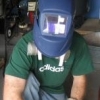Well, folks, I think I have finally found a reliable explanation for the betrayal of my body to my own wants and agency. After much critical thinking, diagnostics, and considering of my own familial history, I am nearly 100% convinced that the answer is Ehlers Danlos Syndrome.
Now, I actually considered this possibility a few years ago, but dismissed it for some reason - even after noting that I definitely have the classic joint hypermobility and elastic skin. I think I wrongfully assumed that because I am a man, the odds were stacked against me, as EDS has an estimated 80-90% of sufferers being women. It took a visit to a rheumatologist, who was quite surprised to see the things I can do in terms of flexibility and told me I have something called Benign Hypermobility Syndrome. Logically it follows that when one's joints just aren't put together tightly, that the stabilizing muscles have to pick up an excessive amount of the slack. This, predictably, results in joint injuries, pain, and other musculoskeletal issues following physical activity and/or exercise. It turns out that the current thinking dictates that BHS and EDS hypermobility subtype are, for all intents, the same thing. As best as I can tell, the determining factor about which one you get labeled with comes down, as usual, to medical politics and individual physician's personal bias. If the medical powers don't want to send you for a genetic test, or they just don't believe that you have EDS, you get labeled with a useless diagnosis like BHS. I personally believe that it is EDS classic subtype for me, but that is really splitting hairs.
I dug a little deeper and see that I score a solid 7/9 on the Beighton criteria, and I'm kind of on the fence about the 5th fingers on either side. Then, moving on to the Brighton criteria, my hypermobility satisfies one major criteria, and I also have four minor criteria and what is clearly an immediate familiy history. In addition to this, I have some things that are oddly specific to EDS, like atrophic scarring, floating patellas, Trendelburg's sign, and mysterious movable hardened nodules along my shins and forearms (subcutaneous spheroids), that I don't see what else to think. My mom has terrible osteoarthritis, multiple replacement joints, Raynauds, skin tags, elastic skin, and other signs, and as I only recently recall, mentioned how she was quite hypermobile before her body started falling apart in her late 30s. One of my sisters shares the same early onset arthritis, musculoskeletal curiosities, and fatigue and dysautonomia cooties that I have thoroughly described.
Connecting the dots, EDS immediately explains the fatigue, post-exertional worsening of symptoms, joint crepitus and injuries, and other musculoskeletal complaints. Indirectly, because collagen is literally everywhere in the human body, EDS can also explain everything else as well. I most likely have gut complications, such as intestinal permeability, that explains my trouble with weight, nutrient malabsorption, and post-prandial zombieness. Finally, dysautonomia, caused by the biological stress over numerous micro-injuries sustained by my muscles having to work too hard, can explain the non-restorative sleep, every cognitive curiosity, and of course, the orthostatic issues, cardiovasular abnormalities, electrolyte imbalance, and cold intolerance. Looking back, I have had most of these problems all of my life and I probably hit the wall four years ago because I was subjecting myself to excessive biological stress. One thing most people don't seem to understand is that "stress" includes physiological stressors, and indeed the notion of stress worsening pre-existing conditions is plausible far beyond the psychological realm. Psychological stress being a cause of ill health is a popular notion among doctors and lay people alike, but too often biological stress is minimized and underappreciated by these same people. Its probably even worse being a male and a military veteran, where my indoctrination of "push through the pain," "mind over matter," and putting on a tough face and not complaining really fucked me over.
In particular, I continue to be amazed by the importance and gravity of sleep. I now believe that the non-restorative sleep, parasomnias, and other sleep wierdness I have written about comes down to adrenaline. This article gives an interesting take on the issue and I think is very relevant to anyone suffering from any chronic disease. Inescapable and unavoidable biological stress from merely living causes a constant adrenaline response that destroys my sleep, probably downregulates the catecholamine receptors in one's brain leading to ADHD and other cognitive issues, and leads to dysautonomia. Personally, the part about "parasympathetic responce phase" really resonates with me as this has been a continuing theme. Its like, I don't get the pure sympathetic responce one would expect from constant circulating adrenaline, but instead, its like the parasympathetic nervous system is usually on at full blast as well. Think of the stereotypical 80-year old man in Florida driving with the brakes constantly depressed, and that's my life. Ultimately, I reason that combating adrenaline will help make a real difference in addition to the pacing I already use. I still don't know how to do that as clonidine gives me paradoxical effects and propanolol and atenolol just don't work well enough. Maybe guanfacine is on my horizon.
EDS and the complications explains every single symptom on my list except one: the lymph nodes in my groin. I thought these were chronically swollen, but a physician examination and CT scan confirm that these lymph nodes are permanently calcified. Oddly enough, I also have some "benign" calcification on one side of my thyroid as confirmed by examination and ultrasound. I attribute these calcified masses as signs that, in fact, my immune system did sequester some infection in these places; however, the importance of these isn't really apparent or significant. This probably explains what happened in terms of the mystery leg bite I had in the summer of 2013, as of course, those lymph nodes in the groin would have "drained" that leg. There is a chance I could still have chronic EBV, chronic strep, pheumoniae bacteria, or tick-borne infections complicating matters, but I'm just not sure how important that is given the fact that EDS will contribute a massive amount of issues into the equation. I mean, what's the point of confirming and/or treating active infections when the EDS is not really treatable and will itself leave my body chronically run down and dysautonomic - perhaps, to some extent or another, for rest of my life barring a miracle cure in the future? The cynic in me says even if a cure does come along, it will probably be something like stem-cell therapy or IVIG that only the top 1% in wealth, or the impeccably insured, will be able to afford or have access to. It is always the same when a miracle drug or treatment comes along; it takes a long time to trickle down to the masses who are, by the disease burden they carry, unable to achieve wealth or inroads to good medical treatment.
Effectively, I can say the story of Zombie Hell is effectively settled for me. Perhaps this story and resolution can serve as use for those to whom my experience resonates. My particular outcome is not a good one, and while I was legitimately hoping that I could find a root cause that is treatable and curable, I have to admit that I'm not surprised it came to this. Some people are just born with the short end of the stick and forsaken by the cosmos, and faced with a lifetime of illness that is dehumanizing and tough to rationalize in terms of what kind of higher power would do this to people.
Edited by Dichotohmy, 28 October 2017 - 08:10 PM.






















































